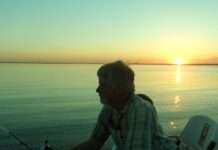Decades ago when the Republicans had genuine leadership, the party celebrated its elder statesmen. After the Tafts and Teddy Roosevelt, Republican respect began to take root in Kansas, first with William Allen White and then Alf Landon, Frank Carlson and Dwight Eisenhower; later, Bob Dole and Nancy Kassebaum.
Landon, in 1936, and Dole (1996) were nominees for president. Eisenhower was nominated in 1952, elected, and reelected in 1956.
In earlier days the heat source of political parties was in local wards and precincts. Members organized, had committee meetings, raised money. Campaigns were incubated in neighborhoods and township halls, moored in district conventions.
Each party’s wellspring, its issues, messages and candidates, had strong beginnings in the awareness and experience of people at home. Political parties once reflected the principles and expectations of local citizens, not the fever dreams of Washington power mongers or faraway cause lobbies.
*
After his landslide loss to Franklin Roosevelt, Landon dusted himself off, built a mansion in Topeka and began a retirement career advising the national conscience. For Republican Kansas and an assorted America, Landon became a durable and learned sage. People paid attention for decades.
For example, in late 1962 Landon was asked in an interview with The New York Times to describe his political philosophy. “I would say practical progressive, which means that the Republican Party or any political party has got to recognize the problems of a growing and complex industrial civilization. And I don’t think the Republican Party is really wide awake to that.”
At the time Landon was, like his friend Dwight Eisenhower, a global figure. He had come to Kansas as a teenager with his family, graduated from KU in 1908, worked in a bank, then made an early venture into the oil business and by 1929 had earned a fortune. All the while he acquired respect and status as a progressive, a two-term governor (1933-37) and presidential nominee.
Landon’s remarks in that Times interview seemed prescient. He was a respected raconteur, tuned to the ways and means of American politics and culture even three decades after his presidential race.
Republicans began to drift right in the 1960s with Goldwater, then Nixon and Reagan, but Landon remained a fixture in the party’s liberal wing, its considerable history. He had opposed Republicans who supported the Neutrality Act in the 1930s, fearing it would give Nazi Germany the impression that the U.S. wouldn’t fight; when Britain needed help, he urged $5 billion in foreign aid.
Landon had declined to campaign vigorously against Franklin Roosevelt, mostly because he liked many of FDR’s controversial domestic policies known as the New Deal. Although the national debt had increased (to $7 billion) and seven million Americans were jobless, Landon saw that beneath even the ugliest numbers, things had improved. Unemployment was high, but half what it had been in 1932. The banks had been saved. National income and profits were up. The Dow Jones average had nearly doubled.
*
Landon’s vision embraced the world. The stuff of his dreams often became issues or answers, policy or law: Civil rights. Recognition of “Red China.” Trade with the communists. Aid to Greece and Turkey to counter communist threats. He backed the Marshall Plan for reconstructing Europe after World War II. In 1961, Landon argued that the U.S. should join Europe’s Common Market even as President Kennedy urged only cooperation. And Landon supported many of President Lyndon Johnson’s Great Society programs, including Medicare.
On Dec. 13, 1966, Landon delivered the first in a lecture series named for him at Kansas State University, entitled “New Challenges in International Relations.” The theme rings yet, and the Landon Lectures continue to feature world leaders and political figures including seven U.S. presidents: Richard Nixon, Gerald Ford, Jimmy Carter, Ronald Reagan, George H. W. Bush, Bill Clinton and George W. Bush. Landon also addressed the GOP national convention in Kansas City in 1976. He and his wife, Theo, welcomed President Reagan to their Topeka home in September 1987 to celebrate Landon’s 100th birthday.
Landon died a month later. He may be seen at once as a celebrated and displaced hero, a champion of the disillusioned, ever insisting that the world is better when we seek to embrace more than our own kind.




